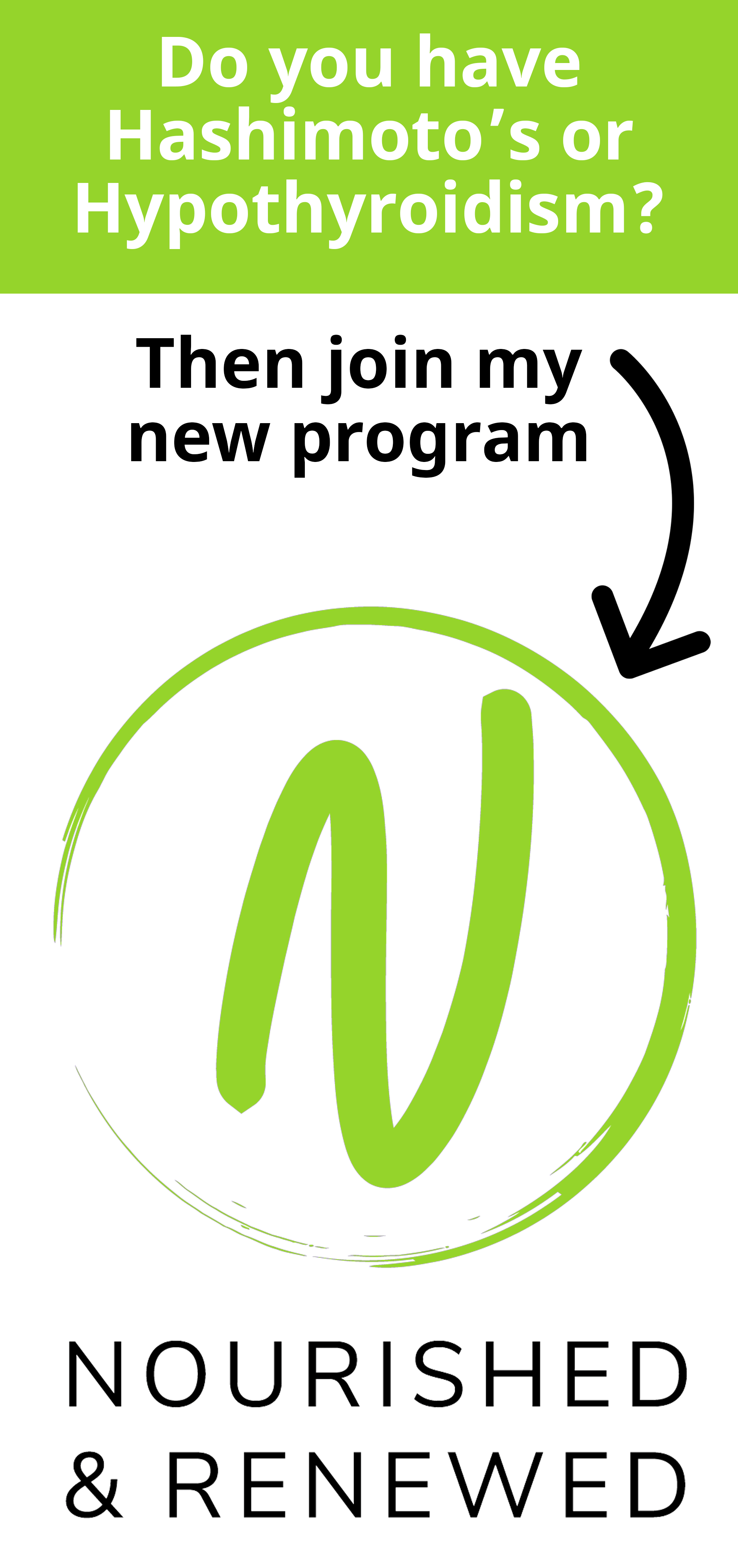Before Hashimoto’s: My IBS Story
You may have already read my Hashimoto’s story.
I have been through a lot on my Hashimoto’s journey. Miscarriages, postpartum thyroiditis, and adrenal troubles have affected me at some point along the way.
My Hashimoto’s diagnosis was in 2003. I have no doubt that years of Irritable bowel syndrome (IBS) symptoms were at the root cause of my autoimmune thyroid disease.
This blog post goes into detail about the relationship between chronic IBS and Hashimoto’s.
(FYI: I will share more about how my “IBS” was really misdiagnosed Celiac disease in my next blog post - in honor of Celiac Awareness Month.)
So, back to my IBS story - I had quite a lot of tummy troubles as a kid.

By tummy troubles, I mean I had chronic diarrhea. Like, every day.
And, because I was a very sensitive, empathetic child, most people in my family assumed that my tummy problems were related to worrying. “Her stomach hurts when she gets emotional,” is what I heard.
I spent a lot of time during my childhood in bathrooms at pool parties, birthdays, pizza restaurants, my grandmother’s house, school, church and my friend’s houses.
While studying abroad in Paris my junior year of college, I had some of the most mortifying experiences.
France is not particularly keen on public “toilettes” and I was reduced to “holding it” too many times. I had accidents there.
I thought I might die of embarrassment, but luckily, I knew when I got back home, it would be behind me. No pun intended.
Post-college, I started a stressful corporate marketing job and things only got worse.
My 30-minute morning commute included one or two pit-stops just to make it to work. I started keeping extra clothes in my car trunk.
So, I went to the doctor and I was told that I had IBS.
She told me that the “solution” was to eat more fiber, especially more whole wheat.
So, that is what I did. I ate 2-3 slices of whole wheat bread per day. (!!!!)
The next step was that my doctor put me on a medication called Bentyl which caused awful side effects, so staying on it didn’t last long.
Around this same time, I was having other health issues – such as fatigue, chronic sinus infections, skin rashes, weight issues.
And I knew something had to change.

What is IBS (Irritable Bowel Syndrome)
From the medical perspective:
IBS is also known as spastic colon, irritable colon, mucous colitis, and spastic colitis.
The symptoms vary in severity and duration from person to person. However, they last at least three months for at least three days per month.
There are three types of irritable bowel syndrome, or IBS
- IBS-C (with constipation): This comes with stomach pain and discomfort, bloating, abnormally delayed or infrequent bowel movement, or lumpy/hard stool.
- IBS-D (with diarrhea): This comes with stomach pain and discomfort, an urgent need to move your bowels, abnormally frequent bowel movements, or loose/watery stool.
- IBS with alternating constipation and diarrhea.
There are about an equal number of people with IBS in each category. There is also evidence that most people with IBS will alternate between types over time.
Doctors call IBS a “functional gastrointestinal disorder.”
This means that the gastrointestinal (GI) tract doesn’t function properly but does not show any physical damage.
In reality, IBS is a diagnosis of exclusion, meaning after extensive lab testing, with results coming back normal, they didn’t find anything else.
“IBS” is generally a catch-all diagnosis to explain a common set of symptoms.
Because of this, conventional medicine focuses on managing the symptoms of the disease.
This is usually managed with medications to reduce discomfort and urgency for those with IBS-D (diarrhea).
From a holistic nutrition perspective, we know that IBS isn’t just uncomfortable and potentially embarrassing.

It is a sign that something is awry in your gut.
We also know that addressing the symptoms (while ignoring the underlying digestive problems) can lead to even more serious problems, including an autoimmune disease like Hashimoto’s.
Several digestive conditions are commonly misdiagnosed as IBS:
- Celiac disease (autoimmune)
- Gluten intolerance
- Fructose malabsorption
- Dysbiosis (increase in "bad" bacteria in digestive tract)
- Parasites – due to international travel or exposure in the wild
- Inflammatory bowel disease (Crohn’s disease, ulcerative colitis, ulcerative proctitis, also all autoimmune)
Is “IBS” the Same as Leaky Gut?
Leaky gut syndrome, also known as “increased intestinal permeability,” is a condition that has been linked to a variety of health problems, including IBS.
Leaky gut refers to a condition in the body where the tight connections between the cells that line the digestive tract are damaged.
When the connections are damaged, they can no longer provide the snug barrier protection they were designed for.
Imagine the roof is leaking at your home. You would take immediate action to repair the roof!
Because you know that the purpose of your roof is to keep the outside world from entering the interior of your home.
Not repairing the leaky roof would, of course, result in severe damage to the inside of your house.
When increased intestinal permeability (or leaky gut) is taking place inside your GI tract, the wrong molecular substances are able to pass through the gut wall barrier.
These molecules launch an inflammatory response not just inside the GI tract, but also throughout the immune system and whole body.
It is this inflammatory response that damages the organs of the body and plays a role in the various serious health conditions.

IBS and Leaky Gut are not the same thing
Researchers have been looking into the relationship between intestinal permeability and IBS.
Studies have found that an increase in small intestine permeability can contribute to the onset of IBS-like symptoms, especially IBS-D.
I believe IBS-like symptoms (from having a leaky gut) are a direct result of an unhealthy, modern lifestyle.
Inflammatory foods, sugar, alcohol, medications, infections, and chemicals our bodies are exposed to lead to intestinal permeability. And the chronic stress we face everyday further worsens leaky gut.
Our bodies are not meant to know how to handle the breakdown of that crucially important epithelial lining. And, truth be told - most of us have some degree of leaky gut. Yes, true.
So, IBS and leaky gut are not the same thing, but in my opinion, leaky gut is the root cause of the IBS-like symptoms.

Is “IBS” Caused by Food Intolerances?
Food sensitivities and intolerances are a common reason people come to see me in my nutrition practice.
Let me backup and explain a couple of important things first.
There is common misunderstanding about the differences between food allergies and food sensitivities or intolerances.
Food intolerances differ from “true food allergies” by medical definition.
The medical community considers true food allergies only as IgE-mediated immune response which is best known for its immediate and severe reactions such as anaphylaxis, which can be life-threatening.
Approximately 4% of the American population has this type of IgE-mediated food allergy.
I get asked all the time by my clients: “What are the main differences between IgE-mediated food allergies and IgG-mediated food intolerances?”
This helpful chart explains the most common differences between the two categories:
IgE “true” food allergy |
IgG food sensitivity/intolerance |
|
| Immune Response | Production of IgE antibodies
Release of histamine mediated by IgE antibodies |
Production of IgG antibodies
Release of inflammatory mediators caused by binding of IgG antibodies |
| Common symptoms | Can be life-threatening, anaphylaxis, swelling of the mucous membranes, itching, rashes, hives, sometimes vomiting | Inflammatory symptoms including: constipation, diarrhea, gas, bloating, Irritable Bowel Syndrome (IBS), fatigue, migraines, weight management issues, eczema, chronic |
| Onset of symptoms | Immediate reaction within a few minutes | Several hours to three days |
| Testing | Skin prick (RAST) test or IgE blood test, sometimes a food challenge test | IgG-mediated antigen blood test (such as the Food Inflammation Test), often a food challenge test |
NOTE: I offer the IgG-mediated antigen blood test (Food Inflammation Test) in my office in order to determine the presence of food intolerances.
Unlike an immediate or IgE-mediated food allergy, IgG-mediated intolerances/sensitivities are much more commonly due to delayed-immune reactions to foods.
In fact, 76-80% of the population are likely to have this type of reaction to foods. I believe this is in large part due to the increasing rate of leaky gut!
Food intolerances are intimately linked to your body’s immune system
The immune system is the body’s defense against foreign invaders, such as poisons and harmful bacteria.
Intolerance to foods can develop when food particles are absorbed into the bloodstream before the food is fully digested, due to leaky gut.
And, as I discussed in the previous section on leaky gut, leaky gut is often the root cause of IBS.
In leaky gut, partially digested foods are viewed, not as nutrition, but as invaders, which alert the immune system to form IgG antibodies.
Therefore, if someone regularly eats foods to which they are intolerant, they are continually placing their immune system under stress.
So, yes, I believe IBS is caused by negative food reactions in the body.

Common Symptoms of an IgG Reaction (delayed-immune reaction):
Reactions produced by food intolerances are inflammatory and can be involved in a whole host of health problems.
Sometimes food intolerances will not produce the same reaction each time.
The foods or substances that cause masked reactions are often the ones people are exposed to on a regular basis.
- Anxiety
- Headaches & Migraines
- Nausea, Low Appetite
- Depression
- Bloating/Gas
- Diarrhea
- Constipation
- Acid Reflux
- Joint Aches
- Fatigue
- Mood Changes
- Hyperactivity in Children
- Shortness of Breath
- Pounding Heart
- Muscle Weakness
- Brain Fog/Memory Issues
What I commonly see in my practice is that people rarely correlate their symptoms with foods they eat.
This is because it can take up to 72 hours after ingestion before they develop any symptoms at all.
Interestingly, a person with food intolerances will often crave the food causing the problem and feel temporarily better when eating it.
Thereby, making it even harder to identify food intolerances based on a food elimination challenge alone.
Common Food Intolerances That Can Lead to Leaky Gut
Yes, there are common foods which have been shown to cause inflammation in the body, and lead to leaky gut, other food intolerances and digestive symptoms.
In fact, another predominant theory on the cause of leaky gut suggests that certain foods which promote the growth of unhealthy gut bacteria are linked to many chronic diseases including IBS.
Research suggests that bacteria play a key role in the environmental influence of the immune system by way of the digestive tract.
In other words, about 70% of our immune system is located in our digestive system. And our immune system is partly regulated by the presence of both good and bad bacteria in the digestive tract.
This next finding blows my mind! ...

DNA of gut bacteria (genetic material of bacterial that lives in the GI tract) has been found in the joints and soft tissues of Rheumatoid Arthritis (an autoimmune disease) patients.
Researchers theorize that the presence of gut bacteria in the joints of Rheumatoid Arthritis patients is due to leaky gut. And this condition facilitates the migration of gut bacteria to other tissues and organs.
This bacteria can trigger local and systemic immune activation, leading to autoimmune reactions.
Dysbiosis is now an established factor in the development of leaky gut and resultant autoimmune diseases (like Celiac disease, Hashimoto’s, Rheumatoid Arthritis, etc.).
In layman’s terms: bad gut bacteria leads to leaky gut which leads to autoimmunity.
Conversely, a healthy gut “microbiota” (or positive bacterial balance) is protective, as it regulates and supports immune homeostasis.
Ok, so what foods could be messing with your bacterial balance, creating a leaky gut and triggering digestive symptoms like IBS?
Wheat and Gluten:
Where is gluten found in foods?
- Wheat-based products: bread, pasta, cereals, wheat flour, couscous, crackers, baked goods, cakes, by-products of wheat added as thickening agent to sauces, ice cream, processed foods, and more.
- Other gluten-containing grains: barley, rye, bulgur, seitan, teff, triticale and some oats that are grown in fields close to wheat fields (they cross pollinate and the wheat contaminates the oats). This means beer (made with barley AND wheat) also contains gluten. Only “certified gluten-free” oats are 100% gluten free.
Gluten isn’t called the “great masquerader” for nothing.
It contributes to leaky gut, food intolerances, IBS and many other digestive conditions in a number of different ways.
Gluten and its protein component Gliadin, are the top culprits within the total food category of triggers for leaky gut and food intolerances.
It’s true that some people are more sensitive to gluten than others.
But, research has shown that even if you’re not gluten-sensitive, eating gluten can have significant, long-term effects on the health and balance of your gut bacteria.
And this in turn can affect your immune system and lead to autoimmune disease.
Also, several studies on the digestive system explain how gluten directly impacts the intestinal lining through zonulin production.
Zonulin is a protein found in the digestive system, which is most commonly triggered by a bacterial infection or consumption of gluten.
Zonulin directly loosens up the tight junctions of epithelial cells in the digestive system, increasing the severity of leaky gut.
Dairy products from cows:
Where is dairy found in foods?
Milk, milk powder, cheeses, sour cream, yogurt, butter, buttermilk, and ice cream.
Many people purport to being “Allergic to Dairy.”
The reality some people have lactose intolerance while others have milk intolerance/sensitivity.
Lactose intolerance is caused by a reaction lactose (which is a type of sugar found in milk and dairy products) and is a digestive issue which is caused by an enzyme deficiency.
People who suffer from lactose intolerance are unable to fully digest lactose.
If you have a milk protein intolerance (as defined by a food-specific IgG reaction), your body reacts negatively to the dairy protein, which is called Casein.
Lactose intolerance and casein sensitivity can cause similar symptoms (gas, bloating, cramping, diarrhea, skin rashes) and can both cause delayed reactions.
That is one reason IgG testing can be helpful in determining (or ruling out) one or the other.
How does dairy consumption affect the gut microbiome?
Researchers have found that a heavy cow’s dairy-based diet increases in the abundance of the bacteria known as Bilophila wadsworthia which is capable of triggering inflammatory bowel disease.
 Soy and soy-based products:
Soy and soy-based products:
Tofu, tempeh, soy milk, soy burgers, soy protein isolates.
Soy grown in the United States is 90% genetically modified
Soy has a host of other problems in the body, which I won’t go into here. But, soy in general tends to be difficult for most people to digest.
In addition, research has found that soy products may negatively impact the endocrine system and are therefore best avoided by most people.
Finally, in regard to the microbiome, researchers studying the effects of soy on bacterial colonies have found consumption of soy decreases certain phyla such as bifidobacteria in the digestive tract.
And bifidobactria help digest fiber, prevent infections, and produce important healthy chemicals.
 Corn and corn products:
Corn and corn products:
Where is corn found in foods?
Corn on the cob, corn chips, corn tortillas, corn meal.
Even corn-based animal products can cause an intolerance to that animal protein when consumed.
For example, I have seen clients react negatively to eggs, chicken, farmed salmon, beef and pork that are fed corn-based diets.
When they switched to humanely-raised, pasture-based animal proteins from animals fed their natural diet, those negative reactions cleared up.
Corn, like soy, also makes the top of the list of GMO foods grown in the USA.
GMO “BT Corn” seems to have the biggest impact on the microbiome. BT Corn has been manufactured to create its own pesticide.
This allows every plant cell in the corn to produce a pesticide which destroys the digestive system of the insect eating the plant, and quickly kills the insect.
Humans also eat these plants!
Unfortunately, there is a significant lack of long-term studies on both humans and the environment.
There are studies that show increased infertility and mortality in animals that eat GMO BT Corn feed.
There are now also concerns with toxins from the GMO BT corn being detected in the blood of those who eat the BT Corn.
Choosing organic food in the above categories is always the best bet for your health, especially if you think you may be reacting negatively to a food.
Testing for IgG food reactions is useful if you suspect that a food is responsible for causing your IBS symptoms, but you can't quite identify which food(s).

Why Do People With Hashimoto’s Have IBS?
Ok, super, let’s sum this all up.
As we now know, leaky gut is the origin of both IBS symptoms and autoimmune disease.
Leaky gut is the functional problem with the digestive system.
IBS symptoms are the result.
Long-term leaky gut and inflammation may lead to the development of an autoimmune illness like Hashimoto’s disease.
Hashimoto’s is an autoimmune disease.
Eating foods which contribute to leaky gut serve to promote those IBS symptoms as long as the offending foods stay in the body.
Even if you are being treated (with medicine) for Hashimoto’s.
Synthetic hormone replacement with a medication like Synthroid does not address the underlying digestive issues which may have caused the leaky gut, autoimmunity and symptoms in the first place.
If you have Hashimoto’s and have symptoms of IBS, you can address your leaky gut with nutrition and start to feel better!
Tests Which Can Help Identify Symptoms of Leaky Gut
These are tests I offer in my practice. They are commonly used functional medicine/nutrition tests which give us insight into the leaky gut process in your body.
The best option for understanding the results is to work with a qualified health care practitioner who can help you interpret the results and recommend the best course of action.
Food Intolerance Test (FIT test)
Finding out the degree to which your gut is leaky - as well as the possible food triggers - is the next step.
When your immune system is in hyper-reactive mode, your body may see almost everything as a threat.
It may start producing antibodies to foods you eat all the time, resulting in a food intolerance.
Sometimes the intolerance to certain foods creates obvious symptoms, but more often it creates low-grade systemic inflammation over time.
Testing to determine the specific food intolerances can guide your dietary choices towards anti-inflammatory rather than inflammatory foods, to help your whole system calm down.

G.I. Map Stool Test
This test is ideal for anyone suffering from ongoing digestive issues, such as constipation, diarrhea, bloating, acid reflux, pain in the stomach, and IBS.
The G.I. Map test checks for pathogens, parasites, yeast/fungus, and dysbiotic bacteria as well as other helpful immune markers.
These test results are a huge help for those who have (or suspect they have) autoimmune disorders and leaky gut.
The results of the G.I. Map test are the quickest route to start replenishing the digestive tract with the right beneficial flora via probiotics.
If herbal antimicrobial supplements are needed to correct an imbalance or overgrowth of “bad” bacteria, this test lets you know how to proceed.
For example, you can take oil of oregano* daily in a capsule or tincture to help rid your body of any problematic critters.
(*you can view this product only if you have a Fullscript account)
Heal Your Gut, Heal Your Thyroid
Everyone is different.
But for three months minimum, I suggest the following gut-healing regimen to help get you back on track with your healthy digestive system, immune system and even a healthy thyroid.
So many of my clients find that they have fewer Hashimoto’s symptoms (and may even work with their physician to reduce medication!) after healing their guts!
The best part of healing a leaky gut is that you can better tolerate more variety of foods over time.
Here are the steps to heal your leaky gut.

REMOVE inflammatory foods that wear down your gut lining, creating irritation and inflammation.
Start by removing gut irritants like coffee, alcohol, and sugar.
Also get rid of gluten, dairy, corn, soy (for reasons listed above!) and any other foods which are showing up on your FIT test results.
This elimination food plan works best if you remove these foods for at least 30 days, then reintroduce them one-by-one to see if they cause a reaction.
That way you’ll know which foods to avoid for longer periods.
Continuing to eat foods that produce an inflammatory response worsens leaky gut.
During the elimination, focus on consuming an anti-inflammatory diet with plenty of:
- Vegetables
- organic proteins
- healthy fats like coconut oil, olive oil, avocados
REPLACE the essentials for proper digestion and absorption of nutrients.
If you have leaky gut or compromised digestive function, you aren’t breaking down food properly.
You’ll know this is you if you experience frequent gas, belching, bloating, heartburn, or see undigested food in your stool.
It also means you’re not absorbing the nutrients your body needs for repair and healing.
Start with taking a digestive enzyme at each meal to help you digest.
You may also need hydrochloric acid (HCl)* capsules if you’re not producing enough HCl to break down food in the stomach.
(*you can view this product only if you have a Fullscript account)
Heartburn/reflux is a good sign that you have low HCl.
Cultured foods and beverages (sauerkraut, kimchee, kombucha, natural pickles, etc.,) are a natural source of enzymes needed for digestion and probiotics to boost good bacteria in the gut.
Some people like to also take a teaspoon of apple cider vinegar to help boost stomach acid and improve digestion.

REPAIR your gut lining.
You’ll need a glutamine-based leaky gut medical food* that provides the essential nutrients and amino acids your body uses for intestinal repair.
I also recommend taking curcumin* capsules (minimum of 500 mg) and daily fish oil supplements (minimum of 3 grams) to reduce inflammation.
(*you can view these products only if you have a Fullscript account)
Make sure to drink plenty of both water and a good bone broth. Liquids will help to seal and heal the digestive tract.
REINOCULATE and REBUILD the probiotic levels in the gut.
This is especially important if you have an overgrowth of bad bacteria.
I recommend rotating through several different strains of probiotics so you get good bacterial diversity.
InnerEco makes a fermented young coconut water that is absolutely brilliant at replenishing good bacteria. Start slow and work your way up to 2-4 tablespoons per day.
I also LOVE Metagenics UltraFlora Spectrum* and it has literally saved my digestive system.
(*you can view this product only if you have a Fullscript account)
Also, do your best to increase pre-biotic fiber to feed your bacteria with healthy starches like sweet potato, berries, banana, artichoke, garlic/onion, asparagus, and avocado.

Do You Need Nutritional Support For Healing Your Hashimoto's and IBS?
I applied these holistic principles to my own life and healed my IBS symptoms.
That means, more enjoyment of eating, less worries about health and foods, and more vitality every day!
In turn, my healthy gut has helped to resolve so many of my Hashimoto's symptoms as well.
I have since worked with hundreds of people to help them do the very same thing.
That may sound like a miracle to some, but so many health conditions are reversible through changing diet and lifestyle habits.
Healing the gut and balancing the immune system is where we start.
My 30-day self-paced online program - Nourished and Renewed with Hashimoto's has all the information you need to support your healing journey.
If you are looking for a customized approach plus an accountability partner, check out my Happy & Healthy Adult Program where I can help you uncover your root cause of Hashimoto’s and IBS.
Let's get you on a path towards greater health and achieving all your goals and dreams.



